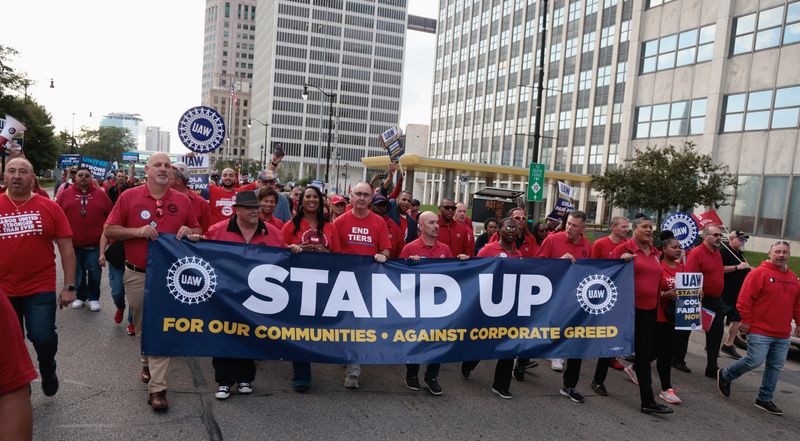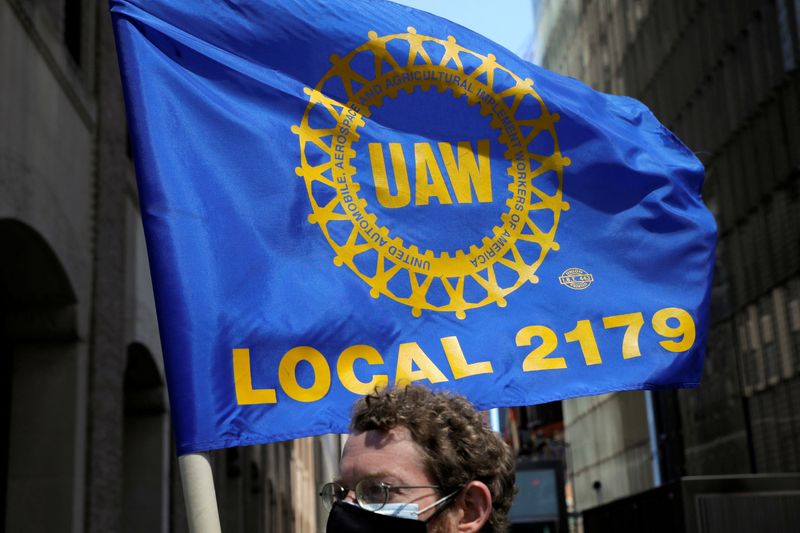By Kevin Krolicki, David Shepardson and Steve Holland
DETROIT (Reuters) -The United Auto Workers said it plans to resume bargaining on Saturday after launching its first simultaneous strikes at General Motors (NYSE:GM), Ford Motor (NYSE:F) and Chrysler parent Stellantis (NYSE:STLA), with effects of the limited shutdown starting to spread on Friday.
The most ambitious U.S. industrial labor action in decades has halted production at three plants producing the Ford Bronco, Jeep Wrangler and Chevrolet Colorado, along with other popular models.
But by Friday afternoon a ripple effect was felt.
"Our production system is highly interconnected, which means the UAW’s targeted strike strategy will have knock-on effects for facilities that are not directly targeted for a work stoppage," Ford said in a statement.
It told 600 workers who are not striking not come to work on Friday and GM told some 2,000 workers at a Kansas car plant that their factory likely would be shut down next week for lack of parts, stemming from a nearby plant being struck.
At a rally on Friday afternoon and at picket lines during the day, union members protested loudly and took special aim at a two-tiered wage system that left new hires without the pay or benefits of seasoned hands. That was unfair and favored investors over workers, they said.
"We’re not going to wreck the economy. The truth is we are going to wreck the billionaire economy," said UAW President Shawn Fain.
The union is demanding a bigger share of profits, shorter work weeks, restoration of defined benefit pensions and stronger job security as automakers shift to electric vehicles.
UAW vice president Chuck Browning, who is leading talks with Ford, told a rally of hundreds of UAW workers in downtown Detroit on Friday afternoon that recent talks have made "good progress, but we have far to go."
U.S. President Joe Biden, who faces re-election next year, called for the auto companies to reward workers just as executives' salaries have risen. "The companies have made some significant offers but I believe they should go further to ensure record corporate profits mean record contracts," he said.
Striking workers said "tier two" employees can make only half the hourly wages of senior UAW workers and get worse benefits.
"That's the biggest thing I hear in our plant: we were built on equal pay for equal work," said Bruce Baumhower, the UAW president for the local including the striking Stellantis Jeep plant in Toledo, Ohio.
Some two-tier systems were set in place during bankruptcies more than a decade ago. The starting wage for tier two workers of $15.78 now is on par with fast food restaurants and has not changed since it was set 14 years ago, he said.
"Fourteen years later, our workers are still in bankruptcy," he added.
None of the Detroit Three has proposed eliminating those tiered wage systems, a key UAW demand, but they have offered to cut the time needed to reach top pay to four from eight years.
"I think they are making progress at the table," said Arthur Wheaton, who teaches collective bargaining at Cornell's School of Industrial and Labor relations. Automakers have raised wage offers and the UAW appears to be focusing its demands. "You're no longer hearing anything about the 32-hours work week from the UAW," he said.
Executives say the union's asks would make the automakers uncompetitive against other nonunion rivals. Ford CEO Jim Farley said the UAW's 40% wage hike demand would "put us out of business." GM CEO Mary Barra on "CBS This Morning" on Friday said "We still have a ways to go with the offer they put on the table last night."
Senator Bernie Sanders, speaking at the Friday rally, retorted, “I say to Ms. Barra, do you have any idea what it’s like for one of your workers to survive on $17 an hour?”
Friday's walkout was smaller than some analysts expected. "Keep the other plants open," said Sofus Nielsen, a 29-year Ford veteran, outside the Wayne plant. "This way we can be out here longer and hurt them more.”
The UAW has an $825 million strike fund but the automakers have built up billions thanks to robust profits from trucks and SUVs.
Biden on Friday said acting Labor Secretary Julie Su and adviser Gene Sperling will travel to Detroit to offer support for talks but the White House said they would not mediate.
Ford shares ended barely changed on Friday, GM stock rose about 1% and Stellantis shares earlier closed up 1.9% in Milan.
The automakers have offered up to 20% wage hikes, without key benefits demanded by the union.
Ford said the UAW's latest proposals would double its U.S. labor costs and make it uncompetitive against Tesla (NASDAQ:TSLA) and other nonunion rivals.
Stellantis said it had immediately gone into "contingency mode" and would take structural decisions to protect the company and its North American operations, without elaborating.
Nearly half the 12,700 striking workers are at the Stellantis plant, although management has been preparing: a parking lot of finished Jeeps is more than a mile long outside the factory.
GM said on Thursday the UAW wage and benefits proposals would cost the automaker $100 billion, but did not elaborate.
Fain has rejected the automakers' assertions, saying the companies have spent billions on share buybacks and executive salaries.

While Biden is pouring billions in federal subsidies into expanding electric-vehicle sales, this shift could threaten combustion powertrain jobs. The UAW has not endorsed his re-election.
Biden's likely opponent, former president Donald Trump, on Friday criticized the shift to EVs as a job-killer for the UAW.
